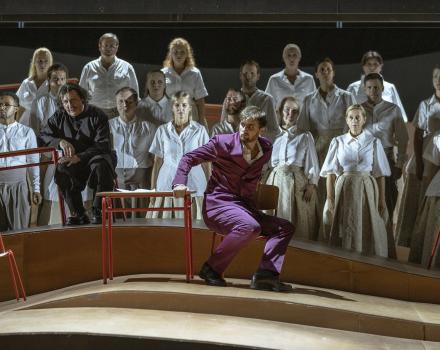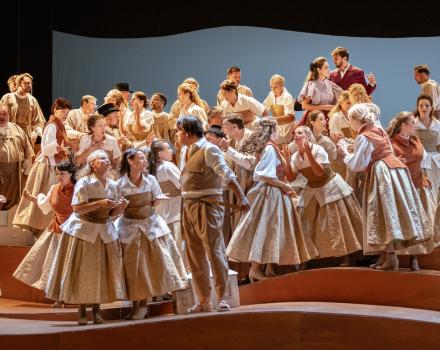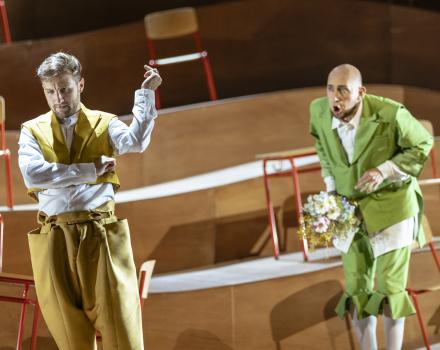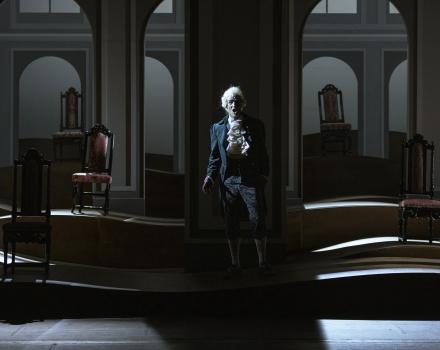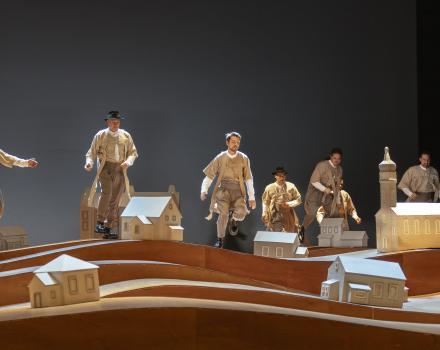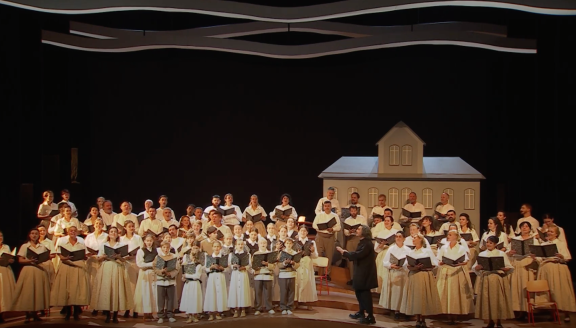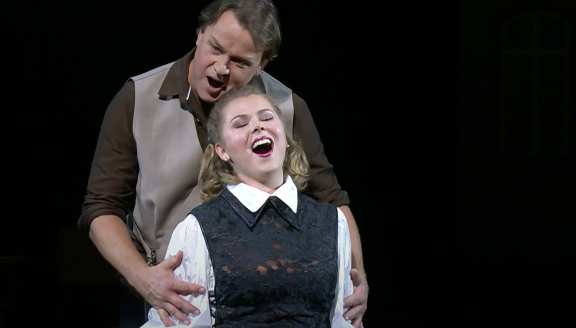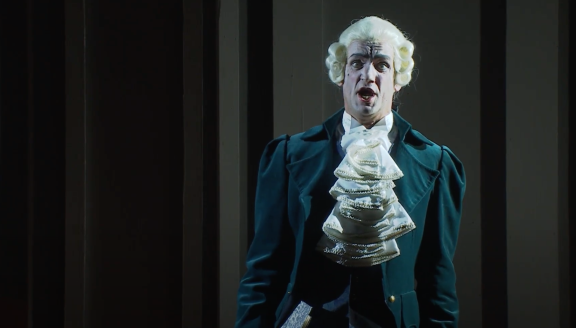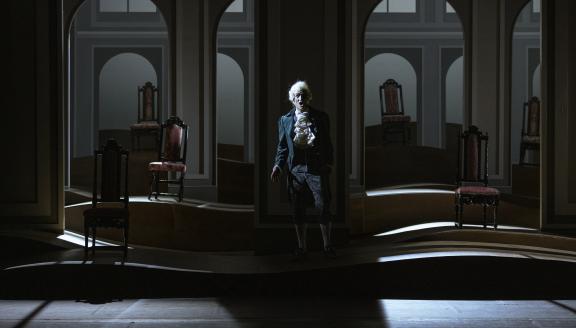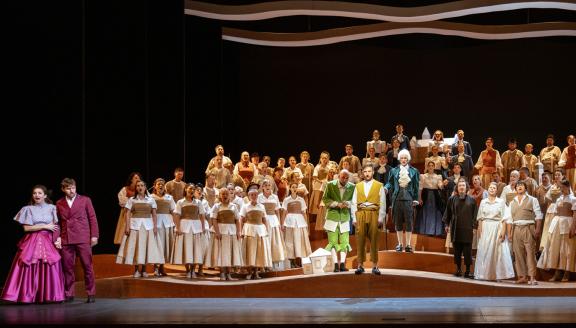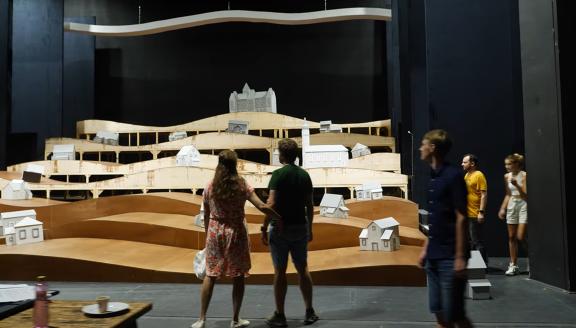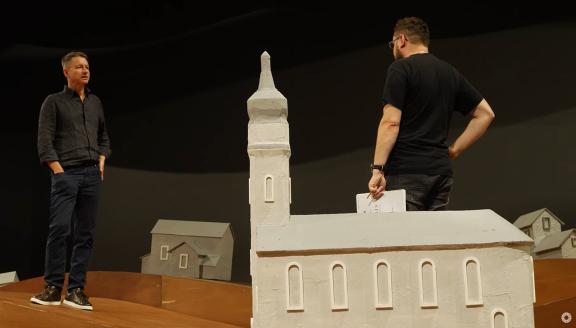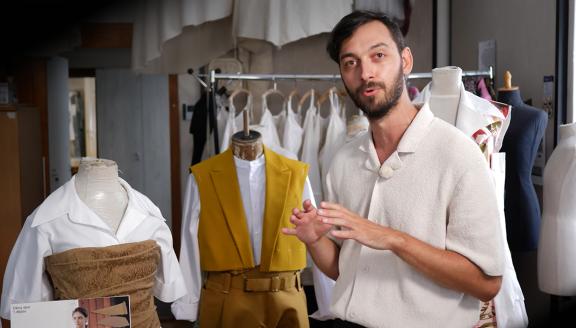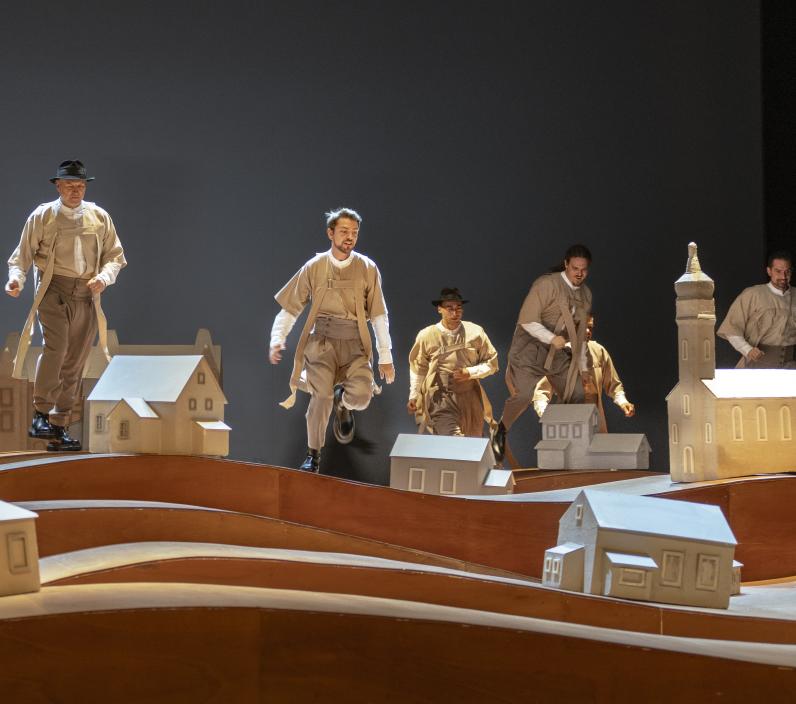
‘We are from Bohemia and you ask if we can sing?’ An unknown couple arrives in a small Czech village from abroad and most of the locals watch them with suspicion. Only the old teacher Benda, a lover of music, opens his door to them, only to find that the strangers are closer to them than one might think.
It is music that has the leading role; that is one way to sum up Dvořák’s opera The Jacobin, as it is music that changes the fate of all the characters in the opera. At the same time, Dvořák has created a charming picture of a Czech town from the Enlightenment era populated with the peculiar figures of the music-loving teacher Benda, his stubborn daughter Terinka who is in love with the young teacher Jiřík or the Count’s conceited steward Filip. Perhaps it was fond recollection of the of his own youth learning music that brought so many charming, rich melodies, both exuberant and melancholic, into Dvořák’s music, whether it be the famous school cantata scene, the duet ‘We have wandered in foreign lands’ or Juliet’s Lullaby. National Theatre Brno offers the opening night of The Jacobin live on OperaVision at the start of the Year of Czech Music; Dvořák’s fitting tribute to Czech music and the people who love it above all else.
Cast
|
Count Vilém of Harasov
|
David Szendiuch
|
|---|---|
|
Bohuš of Harasov
|
Roman Hoza
|
|
Julie
|
Pavla Vykopalová
|
|
Adolf of Harasov
|
Tadeáš Hoza
|
|
Burgrave Filip
|
Jan Šťáva
|
|
Jiří
|
Aleš Briscein
|
|
Teacher Benda
|
Petr Levíček
|
|
Terinka
|
Lucie Kaňková
|
|
Lotinka
|
Jitka Zerhauová
|
|
Orchestra
|
National Theatre Brno Janáček Opera Orchestra
|
|
Chorus
|
National Theatre Brno Janáček Opera Chorus
|
|
Children chorus
|
Brno Children's Choir
|
| ... | |
|
Music
|
Antonín Dvořák
|
|---|---|
|
Text
|
Marie Červinková-Riegrová
|
|
Conductor
|
Jakub Klecker
|
|
Director
|
Martin Glaser
|
|
Sets
|
Pavel Borák
|
|
Costumes
|
David Janošek
|
|
Lighting
|
Martin Špetlík
|
|
Assistant choreographer
|
Martin Pacek
|
|
Dramaturgy
|
Patricie Částková
|
|
Chorus master
|
Pavel Koňárek
|
|
Children chorus master
|
Valeria Matašová
|
| ... | |
Videos
Story
Act I
It is the day of festivities and singing is coming from the church, to which Bohuš, the son of the Count of Harasov, and his wife Julie are listening with emotion. Years ago, Bohuš parted ways on bad terms with his father, who blamed him for his sympathy for the French Revolution and marrying Julie against his will. Bohuš left for France, and now he and Julie have returned, eager for reconciliation with the Count. The locals arrive from the church, among them the teacher Benda with his daughter Terinka and her sweetheart – his assistant Jiří. But the arrogant burgrave Filip is also attracted to Terinka. The jealous Jiří is not happy about it and when the burgrave takes Terinka to the dance instead of him, he mocks him in anger with a song. The burgrave promises to take revenge by making sure he is conscripted to the army. The sound of trumpets announces the arrival of the Count, who brings his nephew Adolf. Benda considers him to be Bohuš and rejoices at the reconciliation between the Count and his son. However, the Count curses his son in front of everyone and introduces Adolf as his new heir.
Act II
At school, Benda rehearses with the children a festive cantata which he has composed in honour of the Count and to welcome the new lord of the castle. The rehearsal is over, but Jiří secretly returns to Terinka. Benda catches them and the young couple have no choice but to pretend to be rehearsing their duet from the cantata. Benda sees through their deception and declares that Terinka will marry the burgrave. Both Terinka and Jiří threaten to ruin the evening's show. The women of the town come running in with the news that two foreigners have turned up and are said to be dangerous agents of the revolution, Jacobins! Bohuš and Julie enter the school at the same time. At first, Benda rejects them, but when they convince him that they are artists like him, he offers them hospitality. Bohuš begs him to arrange access to the Count that evening. Filip, the burgrave, arrives to court Terinka. Jiří refuses to leave, and the angry burgrave threatens to have him conscripted immediately. Adolf arrives next, promising the burgrave the office of chief if he catches the suspicious strangers. Bohuš comes out of hiding to protect Jiří. Adolf, who had a great deal to do with Bohuš's quarrel with his father, has him arrested and taken to prison so that he cannot reveal his own intrigue to the Count.
Act III
Jiří tries to reach out to the Count to tell him that Adolf had his son arrested, but the Count throws him in jail. Benda and Julie go to the castle, where they are secretly let in by the key-holder, Lotinka. While Julie hides, Benda pleads with the Count to forgive his son, but he refuses. The Count is only softened by Julie who, in hiding, sings the lullaby of Bohuš's mother. This is a proof of Bohuš's innocence and Count is touched. Bohuš had been condemned to death by the Jacobins, Julie rescued him and together they escaped from France. But now he is a prisoner in his father's castle. The Count promises to make things right. The guests gather and Benda's cantata is performed. Before handing over the estate to Adolf, the Count plans to invoke an ancient law of amnesty to pardon all his prisoners. Both the burgrave and Adolf make excuses, but finally admit that there is a stranger in the castle jail. The Count has him brought in and nothing stands in the way of forgiveness and a happy ending.
Insights
Back to school
Patricie Částková in conversation with director Martin Glaser
School years, a time most of us remember with varying degrees of nostalgia. Favourite teachers and those who used to strike a deep terror in our hearts. The foundation of our life and its future direction. Memories that inspired and, in one case, were turned into an opera. Indeed, it is likely that Antonín Dvořák's youth and his memory of the Zlonice teacher Liehmann, who taught him music theory, were the reason why the composer took interest in the libretto by Marie Červinková. Liehmann's daughter Terinka, with whom Dvořák sang in a choir, certainly played a role in this. Dvořák's music creates an almost idyllic picture of a Czech town, and even the terrible drama ends amicably. Yet it is a portrayal that remains relevant, and one that captures much of our nature. So what will be the first contribution of National Theatre Brno to the Year of Czech Music? Dramaturg Patricie Částková finds out from director Martin Glaser.
With Dvořák's Jacobin, I always felt that it was also a bit of a tribute to Czech teachers, certainly reflecting Dvořák's memories of his youth. Did you meet a Mr. Benda at school?
To me, this is a somewhat special tribute. On the one hand, Benda is the passionate teacher whose heart is burning for his profession, in his case music. He is obsessed with it and will do anything to pass on his passion to everyone around him. On the other hand, another characteristic of his is the Czech servitude in the face of authority, a kind of almost devotional humility combined with a preliminary fearfulness. His inner struggle is quite apparent when he first almost banishes Bohuš and Julie from his house because they are the suspicious much-travelled secularists. And yet, when they show how much they love the Czech song, he would do anything for them. He is a hugely ambivalent character – is the situation as described a manifestation of a guileless, pure heart, or of sheer professional blindness?
But I digress. I was lucky to have ‘my Benda’. She was my chemistry teacher at elementary school. In the days before social networks, she was the terror of the town with her strictness and commitment to science. But at the same time, she was a phenomenon because she knew how to inspire and raise passionate ‘little scientists’. It was also thanks to her that I got into theatre after a rather major turn – majoring in chemistry at the Faculty of Science.
How about you and Czech opera of the 19th century? Recently I read in Divadelní noviny (Theatre Newspaper) that Dvořák couldn't actually write operas and attempts to stage them are an exercise in futility…
I will not hide the fact that I have a lot of completely needless prejudices. Nobody ever forced our national opera on me, but I have images from my childhood of crowds of people in folk costumes standing and singing incomprehensibly in front of plastered houses, and I found it all rather boring. Which is, of course, extremely unfair. But I've never had the time or reason to get acquainted with it all. I first fell in love with Rusalka – The Water Goblin (it was the first and for a long time the only opera I had on a vinyl record), but instead of other operas I fell for Dvořák's symphonies. And then my career led me to other opera composers. When I was offered to consider Jacobin, I hesitated. But only until I listened to the opera. It's the first time I've decided to do an opera primarily on the merits of the beauty of its score. On repeated listening, I experienced the feelings of bliss and emotion, and told myself that this was a strong enough reason to try to come up with a production that would bridge that gap of my own prejudices, because I fear there are many like me. Which is a pity, because the opera is a real musical gem. Of course, in the next stage I needed to formulate the theme we were going to play about, a theme that would resonate with us. Because otherwise a concert version would have sufficed.
Jacobin can be a tricky opera in this regard, each generation has probably seen and sees a slightly different main story line in it...
It's more like several stories that gradually intertwine, get tangled up, and for a while it seems that the scheming will turn into a dark drama, but in the end, everything turns out well, evil is punished, old mistakes are forgiven, and true love wins. And that's what makes it so Czech – small but nice. Czech nature, or a kind of exploration of national character, strikes me as a strong and resonant theme. How we are able to laugh at everything, how quickly we bend our backs, how fearlessly we are able to stand our ground at the crucial moment and yearn for great things and freedom, how easily we are moved and under the rush of emotions we change our minds 180 degrees in the blink of an eye. Jacobin is a kind of small ‘Czech menagerie’, its heroes oscillating between comical and larger-than-life dramatic characters, depending on what seems most appropriate to the situation. And everything is carried by the music as a dramatic factor and the way the characters communicate with each other – they grin in each other's faces with a mocking song, they serenade their superiors with a solemn homage, they sing out their sorrow quite naturally, or they use music to reveal their true feelings hidden in their souls.
So the famous line ‘We are from Bohemia and you dare ask if we can sing?’ still works?
I'm afraid that today it's more like wishful thinking. For me, for example, music education in primary school was sheer torture. I kept wishing that the teacher would play that beautiful classical music from a portable record player, but instead we sang the same folk songs over and over again. There wasn't even much playing of those children's musical instruments, which I also enjoyed. So maybe here, somewhere, are the roots of my (hopefully no longer existing) distrust. In general, it's a shame that we take so little pride in the enormous contribution to music and opera made by people who were born in this country. Sometimes I feel that it all somehow happened in spite of the circumstances, instead of us nurturing our cultural identity on that natural pride.
It's one thing to find a contemporary dramatic line in Jacobin and quite another to find its visual form. What can be done today with this ‘idyllic picture of Czech village life’?
It's rather odd that almost everybody I talk to about Jacobin comes up with the image of an idyllic countryside, while in reality, the opera is set in a small Czech town. It is as if Dvořák wove this image of the Czech countryside, of an idyllic, gently rolling landscape, into his music. As I approach fifty, I feel ever more strongly in harmony with the Czech countryside, picturesquely undulating, with its fields, tree-lined avenues, meadows and forests, streams and rivers, with villages where old lime trees bloom in early summer and the air smells sweet and intoxicating. This undulating landscape has become the inspiration for Pavel Borák's stage concept, which also makes use of the great possibilities of the Janáček Theatre's stage technology to bring dynamism to it. We tried to create an essence, an abstracted image, our own world resonating with everything we heard in the music.
Gallery

